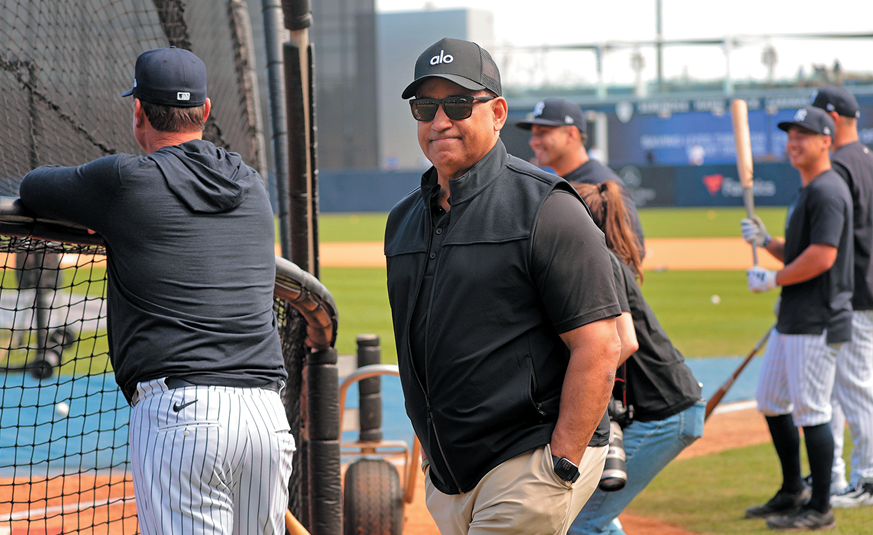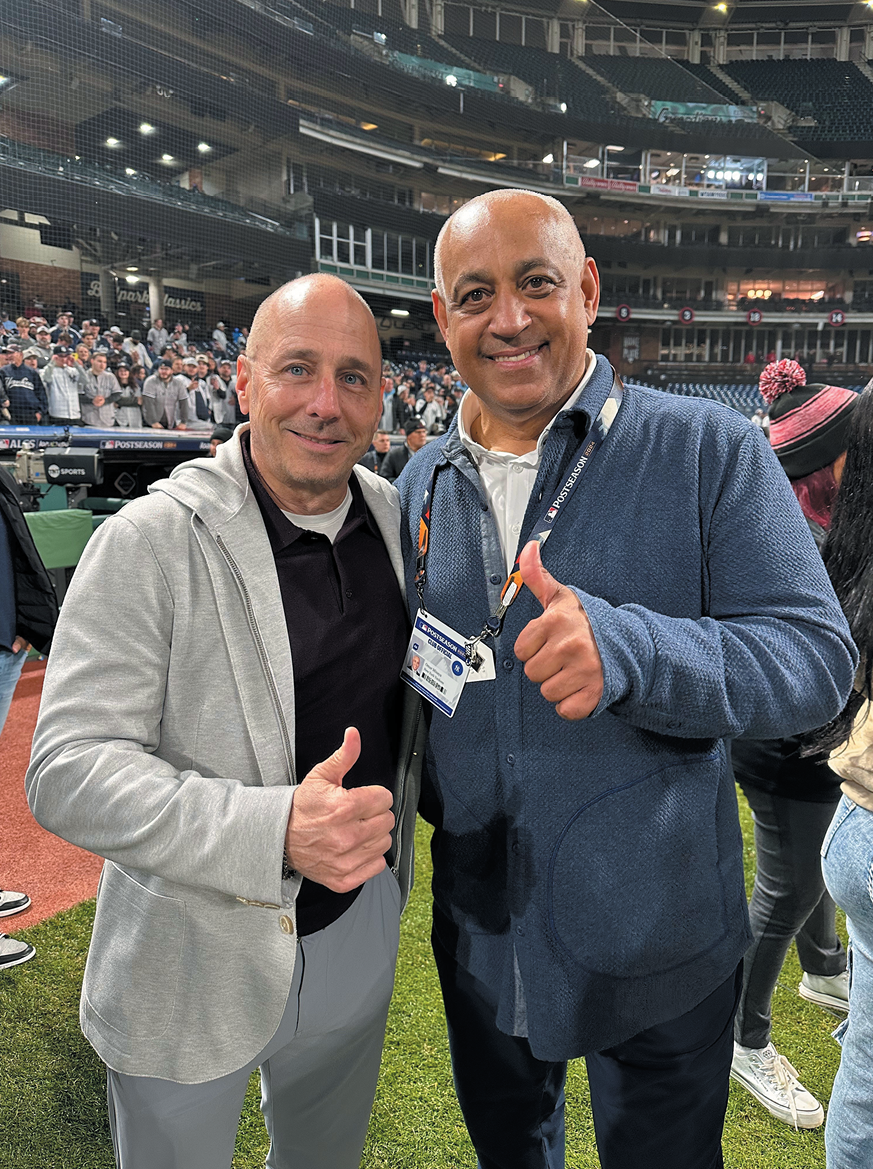- Home
- Media Kit
- MediaJet
- Current Issue
- Past Issues
- Ad Specs-Submission
- Reprints (PDF)
- Photo Specifications (PDF)
- Contact Us
- PRIVACY POLICY
- TERMS OF USE
![]()
ONLINE
![]()
ONLINE

A Life In Baseball
Editors’ Note
Omar Minaya has four decades of front office experience. The Baseball America “2022 Trailblazer Award” winner spent six seasons with the New York Mets, serving as a Special Assistant to the General Manager from 2017-20, and a Mets Ambassador from 2020-22. It marked his third stint with the club after previously working as the organization’s Senior Assistant General Manager from September 1997 to February 2002 and serving as the Mets Executive Vice President and General Manager from September 2004 to October 2010. Minaya began his career with the Texas Rangers, working in their scouting department from 1985-97. He joined the Rangers organization as an amateur scout in 1985 while also coaching the Rookie-level Gulf Coast Rangers from 1985-87. He was named the Latin American Scouting Coordinator for Texas in 1989 and promoted to the Director of Professional and International Scouting in 1994. The Rangers professional scouting department was newly created that season, and it marked the first time in the history of Major League Baseball that a club had dedicated a department solely to professional scouting. After his first stint with the Mets from 1997-2002, he became baseball’s first Hispanic General Manager when he was appointed by MLB Commissioner Bud Selig as Vice President and General Manager of the Montreal Expos in February 2002. He spent three seasons with Montreal (2002-04) before returning to the Mets as their General Manager in 2004. From 2005-10, the Mets posted a 506-466 (.521) record, the third-best mark in the National League during that stretch. From December 2011 to January 2015, Minaya served as the Vice President of Baseball Operations for the San Diego Padres. He also spent three years (2015-17) as a Senior Advisor to the Executive Director of the Major League Baseball Players Association before rejoining the Mets in 2017. Additionally, Minaya was a member of the selection committee for the United States Olympic and Pan-American baseball teams in 2000 when both teams won gold medals. In 2009, President George W. Bush appointed Omar Minaya to his Council on Physical Fitness and Sports. Minaya was born in the Dominican Republic and grew up in Queens where he played baseball at Newtown High School in Elmhurst. He was selected by the Oakland Athletics in the 14th round of the 1978 First-Year Player Draft. After playing in both the Athletics and Mariners minor league organizations, he spent two years (1983-84) playing professionally in Italy.

Omar Minaya at a Yankees practice
Will you discuss your life journey and where you developed your passion for the sport of baseball?
My journey as an American began as an immigrant. My parents came to America because we were a family that believed in human rights. Some of my family members went to jail because they stood up for human rights. We came to Queens, New York, which was a great borough to come to in the 1960s with its diversity and public education system. I built friendships with people from all races and religions, and it was a wonderful growing up experience. This is why diversity has always been a major part of my being, and it has allowed me to always understand and be open-minded. I always say that while I am Dominican, I am really a New Yorker.
There is a picture of me when I was very young and I was given a baseball glove, and my passion for baseball developed very early. I was always an active kid who wanted to be outside, and baseball became my sport. Growing up in Queens where I could walk to Shea Stadium and watching the 1969 Mets built on my passion. When I got into my teens, I started to realize that I had a special talent and was a little different from everyone else. At that time, I had to make a decision to play in Queens with my friends or go play in Long Island where the competition was at a higher level. I decided to play in Long Island which was a big decision for me since there it was an unknown and there was no diversity.
How important was it to be resilient during your career?
Resilience has been a key for me to this day. I have been fortunate since day one to have people in my life who have supported me and been mentors. They taught me to stop blaming others and to always look forward. If a door is locked, don’t spend time dwelling on why it is locked – find a way to unlock it.
“When it comes to my approach to scouting,
I am an eye test guy in a world of data.”
When did you know that you had an interest in working as a scout and for an organization?
In high school, I was a big fish in the pond, but when you get to professional baseball, you become a fish in the ocean. The truth is that in my pond in New York City baseball, I was great, but when I went to the ocean, with my physical ability, it was not that way. This is a perfect example of when the door gets locked, finding a way to unlock it. I realized I was not good enough to play at that level, accepted it, and moved forward.
One of the most impactful times in my life was the two years I spent playing professionally in Italy. This experience really changed my whole being. It changed my way of thinking. I became fluent in Italian and became immersed in the culture. While I speak Spanish and English, I think Italian. Those were transformative years.
How do you describe your roles in baseball over the past four decades?
I am the only person in the history of the sport who has been an executive for Major League Baseball, an executive for the Players Association, and an executive for a team. I was able to do this because I have been open-minded to other people’s ideas and respected other people’s opinions. I will always see myself as a scout, and to be a good scout you need to be able to adapt and recover since there is a high failure rate.
When it comes to my approach to scouting, I am an eye test guy in a world of data. I have so much respect and admiration for the intelligence of the data guys, even though I am the opposite, and to be an effective leader, I believe you need to embrace areas that are not your strength. Whenever I put a team together, I look for people who are not the same and think differently since this is the way to be effective. Effective leadership is about giving space to people who don’t think like you or may disagree with you, and this usually results in the best outcomes in the end.

Brian Cashman, Yankees’ General Manager and
Senior Vice President, with Omar Minaya
When scouting talent, you are clearly looking for the best players, but how important is culture fit in the process?
That is a great point because early on in your career when you are trying to make a name for yourself, it doesn’t matter since you are just looking to win that battle. However, when you are in leadership, and for me personally having been in this for 40 years, culture matters because without the right culture, it is not sustainable. It is possible to build a team that can win without culture, but it will not last. Talent is talent, but if you want to build for the long-term, you must have culture.
An example is “The Yankee Way.” Being with the Yankees now for two years, I have lived the culture and the standards of the organization. There is something about the Yankees that is different, and it starts with the leadership going back to George Steinbrenner, and today with Hal Steinbrenner, Randy Levine, and Brian Cashman. One thing you need to understand about the Yankees is that it is still a family-run business, and there are not too many family-run organizations left. The culture is built on a family feel and philosophy.
When you look at what you have achieved in your career over four decades, are you able to enjoy the process and appreciate what you have accomplished?
The number one thing I appreciate is having raised two great kids who are good citizens. I think about my wife who passed away recently and was, and still is, my best friend. When I reflect, I look at it on the family side, not on the professional side. Being a father and being a husband is my proudest moment.![]()